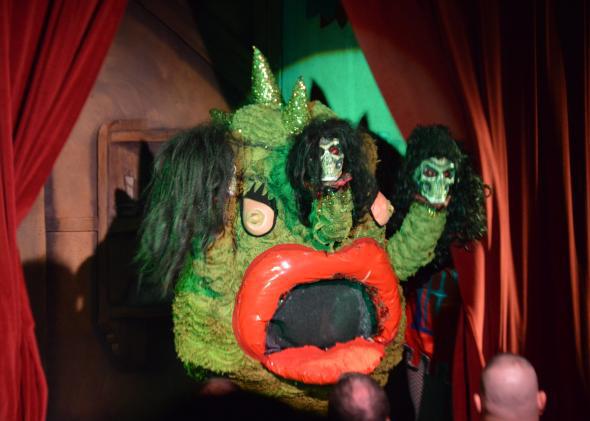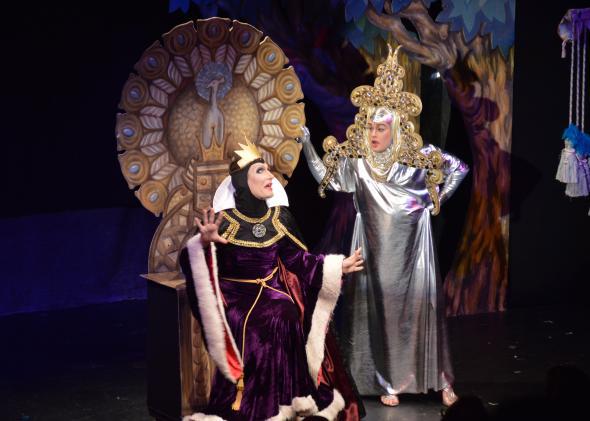For almost 30 years, Ryan Landry and his theater troupe, the Gold Dust Orphans, have been entertaining audiences in Boston and Provincetown, Massachusetts, with his ramshackle remix plays that take their inspiration from sources as varied as Greek tragedy and mid-century melodrama. His most recent work, Snow White and the Seven Bottoms, is currently running in New York City, and it’s a wild ride: Prince Charming falls in love with the foppish magic mirror, the dwarves (here rendered as drag-performing puppets) enlist Snow White in helping them seduce husbands, and the most fearsome creature in the Evil Queen’s menagerie is the perfectly named Kardashidragon. Landry’s writing moves with a Robin Williams-like velocity from high literature to low camp, and my conversation with him zig-zagged delightfully in a similar fashion. Here’s a brief (and considerably cleaned-up) look at the impressive frenetic mind behind the fever-dream plays.
There have been many terms applied to your theatrical productions over the past 30 years: satire, parody, camp send-up, homage, the defiling of classics. Speaking generally, what is it, exactly, that you think you are doing with your work?
I’m just hoping to make people forget their problems … or remind them of them. I mean, I have different styles that I do; for instance, Death of a Saleslady is very serious. And then I have shows, like Snow White and the Seven Bottoms, which are your cartoons, and they’re really just to make people laugh. There’s no touching moment or burning question, or you know, broken hearts. It’s really just a goof …
But if you had to choose one word to describe your distinctive style …
Distraction. Do you know who Loretta LaRoche is? She’s like this motivational speaker. I was having lunch with her one day, and she said one of the greatest things I’ve ever heard in my whole life. She said, “Basically, just keep yourself distracted till you’re dead.” And that’s what I want to do—distract people from their own lives just for a moment … and then maybe bring them back to their own lives with a different outlook afterward.
Also, entertainments. I don’t have very high ideas of myself as a writer. My mother used to make jam at home. Us kids would pick raspberries, just giant things of raspberries and bring them home,and she would mush everything through the thing. That’s what I think I do: I mush all this information, all this classical literature and these great old movies and these silly children’s books and cartoons, and I just sort of mash them through my brain … I’m really a conduit; I don’t believe myself to be an originator, except in the sense of my style.
You draw on a wide assortment of source materials and gay pop culture reference points for your plays. Take me through your thinking while writing something like Snow White.
Take Beyonce. I have no understanding of why every time she farts gay guys run to smell it. And I didn’t with Madonna or many gay icons—I never saw much in Marilyn Monroe, or Bette Midler (although she had that one good album). I don’t really have the same icons, and today I think we’re even worse off. But those people are still sometimes involved in my shows.
For instance, in Jesus Christ It’s Christmas, Whitney Houston plays the rich woman, but she’s so out of her mind high that the secretary is the one that the bishop has to deal with. It’s based on The Bishop’s Wife, and Whitney Houston was in a remake called The Preacher’s Wife, so that’s why she’s in my play. Popular culture to me is this beautiful matrix that you can pull down from and rearrange, and it all still tells a story. I can pull a Shakespeare quote and throw it right next to a fart joke, and I know how to make that work … hopefully!
I understand that you and your troupe, the Gold Dust Orphans, collaborate closely on creating the look and design and costumes of the shows. And when I saw Snow White, I noticed that while it was well-constructed, it also managed to have this sense of always being on the verge of falling apart at any moment.
Oh yeah, you have to keep that! You have to keep that so it gives you license to do whatever you want. For instance, one time we were doing a show in the basement of this church, and one of the actors had a piece of the ceiling fall on his head! So he simply walked off stage, still speaking—this is how well I’ve trained them—and walks back on with an umbrella over his head. And the audience ate it up! As they should have! It was genius.
We do attempt much bigger shows than our budget allows. Not every step is perfect in the choreography, but we’ve still got six dancers up there. I’m a maximalist. I’ve seen too many plays where they take a ladder and put it on the stage and that’s New York City. No, it’s a cheap, $5 ladder you got at a thrift store, and you’re gonna call yourself a minimalist so you don’t have to pay for anything. I believe that if people are buying tickets, you’d better wear all the jewels you’ve got—even if they’re rhinestones.

Michael von Redlich.
Let’s talk about camp. It feels like your version of it has something to do with remixing, with pulling from all over the place and creating something new.
My father used to work in a junkyard. And when I would go with him, he would pretend that the big pile of shit was like a magical mountain that I could play with. And so I would make things out of the junk I found in the pile. Now, I’m not saying that Tennessee Williams or some of these other beautiful, beautiful pieces of work are junk. I’m simply saying that it’s already such a disposable world, I don’t want to discard stuff—I’m not done with it yet. I’m not ready to put grandma in the old folk’s home—I still wanna talk to grandma!
So there’s a criticism I’ve seen in reviews of your work—and it’s something I felt a bit at Snow White myself—that while it’s certainly funny, there’s something about your style that feels dated. Tell me why I’m wrong about that.
You’re not wrong. If I were to see the show and not be me, I might say, “Why the Liza, the Bette Davis?” But the problem is, there’s nothing interesting about a Mariah or Gaga, because I’ve seen people do it better. So maybe that can be seen as dated; but for me I’m not looking back, I’m just looking for the most fun. I don’t refuse to see the value in today’s culture, I just honestly don’t see it.
What will audiences get out of your shows that they can’t get anywhere else?
When people come to these shows, I want people to forget their troubles, I want them to focus on the power we’re giving them. I think the style is very unique—it’s something we’ve developed over the years, over the course of, like, 60 plays now. I don’t think you’ll see anything else like it. It’s not somebody, like, writing on a chalkboard and that’s ACT II. It’s just not. As clumsy as it can be, as threadbare as it can be, we’re still wearing all the rocks we got; we’re still wearing all the threads we got. We’re giving our very best, giving our very most. And I think there’s a beauty in that.
This interview has been condensed and edited for clarity. Snow White and the Seven Bottoms can be seen at Theater 80 in Manhattan’s East Village on weekends from now until Oct. 26.
